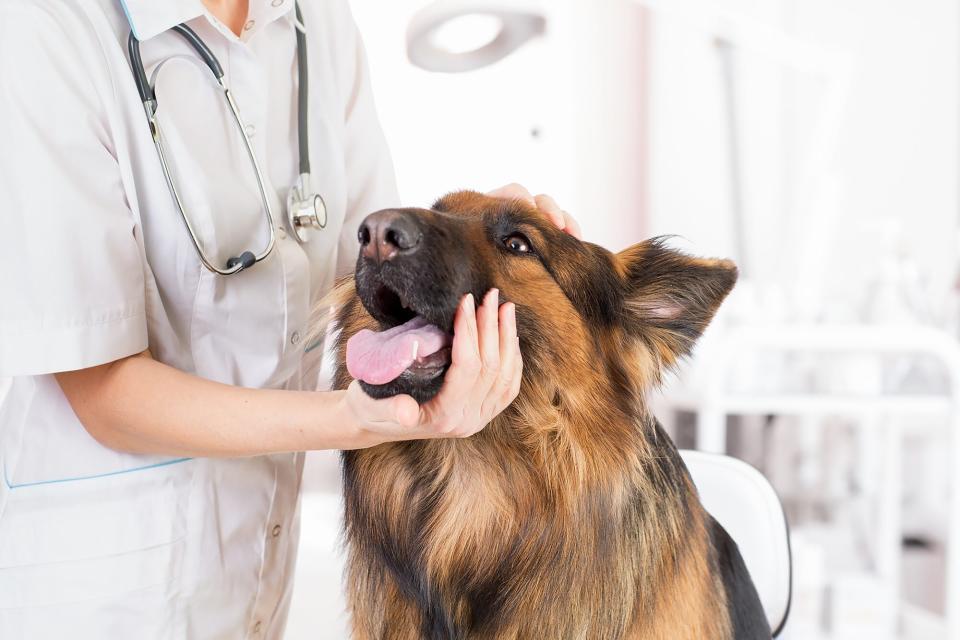Is Your Dog Coughing? Here's What Could Be Causing It and When You Should See the Vet
It doesn't matter if it happens in the middle of the night or after mealtime: A dog coughing is startling. But it's not always cause for alarm.
There are dozens of reasons your dog could be coughing, says Michael Stone, DVM, DACVIM, and an associate clinical professor at Cummings School of Veterinary Medicine at Tufts University. Your buddy might have eaten something wrong, or he could be truly sick.
If your dog's coughing is out of the ordinary, it's time to call a veterinarian like Stone. He asks dog parents about three main factors: the cough's duration (how long it's been happening); frequency (how your dog coughs); and progression (whether it's getting worse).
"If you start hearing a cough, I'd probably jump right on that as it's not a real common thing," he tells Daily Paws.
RELATED: What Is Reverse Sneezing in Dogs, Anyway?
Types of Dog Coughs
When your dog coughs, take note of how it sounds as this can be helpful for your veterinarian to understand what's going on with your pup's health. Consider each of these sounds so you can describe it to your vet:
Coughing and gagging
Coughing and sneezing
Hacking cough
Dry cough
Honking or wheezing
If your dog is coughing in her sleep or coughing up mucus and/or blood, those are important details to note as well, and could mean something serious—especially if there's blood.

Andrey Kuzmin / Adobe Stock
Why Is My Dog Coughing?
It could be some 50 reasons, Stone says. It doesn't happen often, but dogs will sometimes swallow something wrong just like us humans, causing them to cough. But you can usually tell when that's the case because it happens when your dog is eating and the coughing shouldn't last.
(Also, don't be alarmed if your dog is coughing up white foam. That's a byproduct of the coughing that will sometimes happen, Stone says. But you should still get the cough checked out, of course.)
Besides the random or food-caused cough, here are several common reasons your dog might be coughing:
Kennel Cough
This is the most common cause of a coughing dog, Stone says. Kennel cough spreads through the air and on surfaces. However, your dog is still able to live a mostly normal life in spite of his coughing, and your vet can treat his symptoms until the cough wanes.
Tracheal Collapse
It sounds bad, but this is another cough-causing condition your dog can still live with. Tracheal collapse usually affects smaller dogs, like Pomeranians and Yorkshire terriers, when their windpipe flattens. It's chronic, but your dog is still able to live like they usually do, Stone says.
RELATED: Here's Why the Bordetella Vaccine Is So Important
Heart Disease
They don't seem related, but heart disease, most commonly found in older dogs, can cause rapid breathing as well as coughing. Sometimes, heart disease can be fatal, but the untrained eye might not be able to tell. Your veterinarian can give you treatment options.
Pneumonia
Unlike the first two conditions, pneumonia—while not as common—renders your dog obviously ill, Stone says. That means not eating, acting lethargic, and, yup, coughing. Pneumonia can be serious or non-threatening, but you'll still want to visit your vet.
Other potential causes of dog coughing, though not as common, include canine influenza or even canine lung cancer. However, it's best to have your vet review your pup's cough and other symptoms of illness to determine what's really going on before assuming the worst.
How To Treat Dog Coughing and Help Your Pup Feel Better
The best thing you can do to help your coughing dog is call your vet. Stone was hesitant to even offer at-home treatment options because he'd rather people go to their veterinarian first.
"You could be delaying a serious diagnosis," he says.
Plus, you don't want to administer the wrong treatment for your dog. Cough medicines and suppressants are available for dogs, but a dog with pneumonia needs to cough to expel the gunk in their lungs. A cough suppressant can get in the way of your buddy feeling better, Stone says.
So when is it time to call your veterinarian? Stone recommends calling if your dog has been coughing for more than an hour if he's never—or rarely—done that before. He says he can sometimes suss out the cause of coughing with a few questions over the phone, but an examination and even an X-ray might be necessary to determine the culprit.
From there, your vet will decide whether to prescribe any medication.

